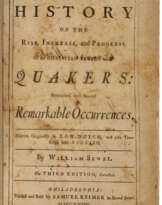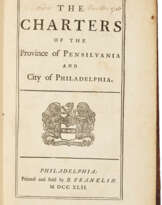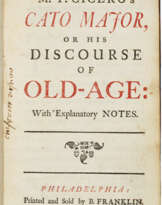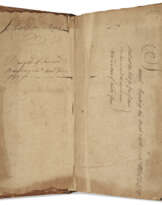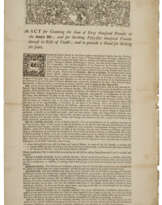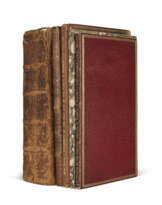The Liberty of the Spirit and of the Flesh Distinguished: in an Address to those Captives in Spirit among the People called Quakers, who are commonly called Libertines
02.02.2024 10:00UTC -05:00
Classic
Sold
1386USD $ 1 386
| Auctioneer | CHRISTIE'S |
|---|---|
| Event location | USA, New York |
Archive
The auction is completed. No bids can be placed anymore.

ID 1129716
Lot 98 | The Liberty of the Spirit and of the Flesh Distinguished: in an Address to those Captives in Spirit among the People called Quakers, who are commonly called Libertines
Estimate value
$ 1 000 – 2 000
First American edition, printed by Benjamin Franklin and preserved in the original paper wrappers, of a rare Quaker tract. “Late in 1759 the Society of Friends in Philadelphia ordered the publication of this piece in an edition of 4,000 copies” (Miller). The printing was completed in mid-June 1760; 1000 copies remained in Philadelphia and the remainder were distributed to Quaker Meetings. Originally printed in Dublin in 1756, its author was a physician whose spiritual diary recording his every minor sin (such as an “indulgence in bed an hour too long”, or being “a little swinish at dinner”). It was posthumously published to the delight of Dr Johnson who laughed heartily at its language of self-condemnation. Miller 719; Sabin 74499.
Octavo (183 x 120mm). (Some spotting and browning, a few leaves a little chipped at corners.) Original plain sewn paper wrappers (frayed and chipped, somewhat stained and browned). Provenance: Samuel [?]Lang (ownership inscription dated 1760 on upper wrapper) – Laird U. Park, Jr., 1922-2001 (his sale Sotheby’s, New York, 29 November 2000, lot 117).
| Address of auction |
CHRISTIE'S 20 Rockefeller Plaza 10020 New York USA | ||||||||||||||
|---|---|---|---|---|---|---|---|---|---|---|---|---|---|---|---|
| Preview |
| ||||||||||||||
| Phone | +1 212 636 2000 | ||||||||||||||
| Fax | +1 212 636 4930 | ||||||||||||||
| Conditions of purchase | Conditions of purchase | ||||||||||||||
| Shipping |
Postal service Courier service pickup by yourself | ||||||||||||||
| Payment methods |
Wire Transfer | ||||||||||||||
| Business hours | Business hours
|

